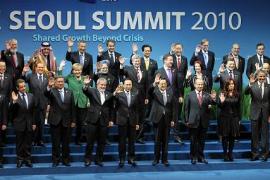Seoul, Korea 2010
G20 Leaders adopted the first G20 action-oriented plan (Seoul Action Plan) that encapsulated concrete economic policy commitments from each G20 members. Leaders also endorsed the first G20 Multi-Year Action Plan on Development and the first Anti-Corruption Action Plan.
Framework for Sustainable Growth
Leaders adopted the Seoul Action Plan featuring specific policy commitments by G20 Members. G20 countries agreed to implement macroeconomic policies, including fiscal consolidation where necessary, to sustain the ongoing recovery and to enhance the stability of the financial system.
The G20 also foresaw the implementation of a range of structural reforms (whose analysis and monitoring was entrusted to the OECD), aimed at boosting and rebalancing global demand, fostering job creation, and restoring the potential for growth. The Mutual Assessment Process was enhanced to promote external sustainability.
Development
Under Korea’s leadership, a G20 development agenda was delivered at the Seoul Summit, encapsulated in the Seoul Development Consensus for Shared Growth and its associated Multi-Year Action Plan on Development (MYAP). The OECD took on a role of "pathfinder" for the G20, by helping Korean authorities shape this "new" G20 development agenda. Alongside other international organisations, the OECD provided analytical support to G20 member countries in order to design the G20 MYAP.
The OECD also contributed extensively to the definition of the G20 development concepts, based on growth and resilience, as well as knowledge-sharing and policy dialogues to benefit low-income countries.
Leaders tasked the OECD with coordinating, jointly with other relevant international organisations, work on five of the nine pillars in the MYAP:
- Human Resource Development,
- Private Investment and Job Creation,
- Food Security,
- Domestic Resource Mobilisation,
- Knowledge Sharing.
OECD Statementes and Reports in Seoul
- Pursuing Strong, Sustainable and Balanced Growth: the Role of Structural Reform (Speech)
- Seizing the Benefits of Trade for Employment and Growth (Final report - pdf)
- 4th Report on G20 Investment Measures
- Report on progress made against international tax evasion (Speech)
- The Scope of Fossil-Fuel Subsidies in 2009 and a Roadmap for Phasing out Fossil-Fuel Subsidies: An IEA, OECD and World Bank Joint Report (pdf)
Main G20 Documents
Further Commitments
Leaders also committed to continue G20 work on:
- preventing corruption through the Anti-Corruption Action Plan;
- to rationalise and phase-out over the medium term inefficient fossil fuel subsidies;
- to safeguard the global marine environment;
- to combat the challenges of climate change;
The G20 asked the OECD and other international organisations and key stakeholders to work on how to mitigate excessive price volatility of food and other agriculture commodities. In addition, the OECD was entrusted with the development of High-Level Principles on financial consumer protection.


